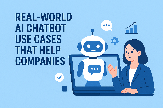


Discover real-world AI chatbot use cases that help companies streamline customer support, boost sales, and improve efficiency across industries.
Artificial Intelligence (AI) is no longer a futuristic concept—it is a reality shaping how companies operate today. Among its many innovations, AI chatbots have emerged as one of the most powerful tools for businesses across industries. From answering customer queries to driving sales, these intelligent assistants are transforming how organizations connect with their audience.
In this article, we will explore real-world AI chatbot use cases that help companies achieve measurable results, boost productivity, and deliver better customer experiences.
AI chatbots are software programs powered by artificial intelligence and natural language processing (NLP) that simulate human-like conversations. Unlike traditional rule-based chatbots, modern AI chatbots understand context, learn from interactions, and deliver personalized responses.
Businesses use AI chatbots to:
Provide instant 24/7 customer service
Handle repetitive inquiries efficiently
Support employees with internal processes
Drive conversions through conversational commerce
With their ability to scale conversations, AI chatbots have become an essential asset for both startups and enterprises.
The adoption of AI chatbots is skyrocketing because companies are under constant pressure to:
Reduce operational costs
Offer faster, more reliable customer support
Generate qualified leads without increasing staff
Create personalized experiences for customers
According to recent studies, businesses that implement AI chatbots experience higher customer satisfaction and improved efficiency. This explains why industries like retail, finance, healthcare, and travel are rapidly embracing chatbot technology.
Now, let’s dive into specific real-world AI chatbot use cases where companies are achieving tangible results.
Customer support remains the most common and impactful use case for AI chatbots. Companies deploy chatbots to:
Instantly answer FAQs such as order status or return policies
Provide multilingual support for global customers
Escalate complex issues to human agents when needed
For example, e-commerce brands use chatbots to manage large volumes of support queries during peak sales seasons, ensuring no customer is left waiting. This reduces wait times and increases satisfaction.
Sales teams benefit from AI chatbots by automating initial interactions with potential customers. Chatbots can:
Qualify leads by asking relevant questions
Collect customer details for follow-ups
Recommend products or services based on user input
For instance, a B2B SaaS company may use a chatbot to engage website visitors, schedule demos, and pass qualified leads to sales representatives. This shortens the sales cycle and ensures opportunities aren’t missed.
AI chatbots play a major role in conversational marketing strategies. Companies leverage them to:
Send personalized product recommendations
Share promotional offers in real time
Engage customers through interactive campaigns
For example, a retail fashion brand might use a chatbot to guide shoppers to styles that match their preferences, leading to higher conversion rates.
E-commerce businesses are among the biggest adopters of chatbots. Common use cases include:
Order tracking and delivery updates
Personalized product discovery
Cart abandonment reminders
Brands like Sephora and H&M use chatbots to act as virtual shopping assistants, helping customers find products quickly and improving overall shopping experiences.
In healthcare, AI chatbots are transforming patient interactions by:
Assisting with appointment scheduling
Providing medication reminders
Offering preliminary symptom checks before connecting to doctors
Hospitals and clinics use chatbots to reduce staff workload while ensuring patients receive timely information.
Banks and financial institutions utilize AI chatbots for secure and efficient customer interactions. Use cases include:
Checking account balances
Assisting with loan applications
Fraud detection and alerts
Chatbots like Bank of America’s Erica provide 24/7 banking assistance, improving customer engagement while reducing call center pressure.
AI chatbots are not just for customers; they also support employees. HR departments use them to:
Answer employee FAQs about policies or payroll
Assist with leave applications
Guide new employees through onboarding
Travel companies use chatbots to enhance the customer journey. Popular use cases include:
Booking flights, hotels, and activities
Providing travel recommendations
Offering real-time updates on delays or cancellations
AI chatbots are no longer optional—they are a necessity for companies that want to stay competitive. From customer support and sales to healthcare and finance, real-world use cases show how these intelligent assistants improve efficiency, cut costs, and deliver exceptional customer experiences.
As technology advances, businesses that invest in AI chatbot solutions today will be better positioned to thrive in the future.
